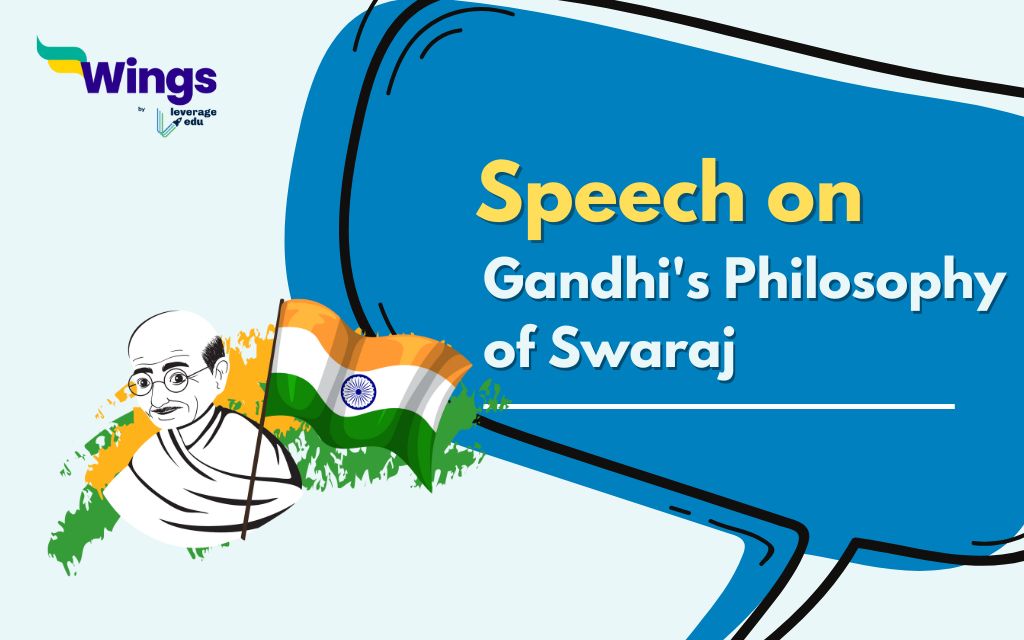Mahatma Gandhi’s philosophy of Swaraj, or self-rule, is central to his vision for India’s independence. It emphasises not just political autonomy but also self-discipline, ethical living, and community empowerment. Gandhi believed that true Swaraj involves freeing the nation while uplifting individuals through moral and spiritual development. This holistic approach fosters a sense of responsibility among citizens, encouraging them to govern themselves and contribute positively to society. Gandhi’s ideals of self-governance and social justice remain relevant today.
Gandhi’s Philosophy of Swaraj Speech
‘Respected Principal, teachers, and all my seniors and fellow friends. Today I am standing before you to deliver Gandhi’s Philosophy of Swaraj speech. My speech will cover Mahatma Gandhi’s ideas of Satyagraha and Swaraj and how he became the leader of one of the greatest nations in the world.
Friends, the simple meaning of Swaraj is self-rule or self-governance. But for our father of the nation, it meant much more than freedom from the rule of Britishers. More broadly, Bapu believes that each one of us should be free from all kinds of oppression and should have the ability to rule ourselves.
According to Gandhiji, true freedom does not mean political freedom from foreign rulers. On the contrary, he believed that after getting independence from the British, Indians wouldn´t be truly free unless their ideas mentally enslaved them. For him, the real Swaraj means freedom from minds, souls, and consciousnesses.
Gandhiji wanted us Indians to have control over our own lives, societies, and nations. He did not want Indians to follow Western ways blindly; instead, he was a supporter of analysing Western culture, values, and compasses.
For him, Swaraj begins with self-discipline and builds up mere qualities like non-violence, truthfulness, and dignity of labour within each of us. Until we conquer our own vices and bad habits, we cannot govern ourselves and justify society.
You all will be surprised to know the way Gandhiji relates Swaraj to villages. For him, swaraj also means decentralization, village self-governance, and self-reliance. He did not want other powers to control us; instead, he wanted to be the master of one’s own life. For this, he believed that every village should be able to sustain itself and make its own decisions through panchayats.
Furthermore, he advocated being Swadeshi, which here means using our labours and resources instead of being dependent on foreign goods and the economy. Self-sufficiency in food, clothing, and other needs was the key to Swaraj.
You all can very well understand his strong stand for Swaraj with his famous quote – ‘Nobody can make free without your concurrence. If you have a mind enslaved by impact and beliefs, you remain a slave.
My dear listeners, the extensive self-rule of Mahatma Gandhi is the only way for us to realize human dignity and truly become independent in every sense. I hope we can follow the path of Mahatma Gandhi to discipline ourselves to achieve the real goal of Swaraj.’
Thank you!
Also Read: Speech on Nurse: Short and Long Speech
Gandhi’s Philosophy of Swaraj Speech in 10 Lines
Let us learn about Gandhi’s philosophy of Swaraj Speech in short and simple 10 lines:
1. The term swaraj means self-rule and freedom. It should be seen that Swaraj here does not mean political independence.
2. Swaraj is encompassed with moral, economic, social, and cultural self-discipline and self-reliance.
3. Gandhi´s means and aims are both important in achieving Swaraj.
4. The core deal of Swaraj is non-violence, truth, and peaceful civil resistance.
5. The key to economic Swaraj is decentralization and village governance.
6. The mere requirement of Swaraj is self-sufficiency and foreign dependency.
7. Swaraj is meant to conquer vices by freeing the individual conscience first.
8. Home rule or Swaraj, is the power given to the people over their own lives and not oppressed by external rule.
9. Gandhi’s philosophy paved the way for an ethical, non-violent, and welfare-oriented society.
10. Following the principles of Gandhiji we can learn how to free ourselves from dependency on others.
Also Read: Speech on AI in English for School Students: Check Samples
Also Read: Speech on the Future of Capitalism for School Students
FAQs
Ans. Gandhi’s philosophy of Swaraj meant the true self-rule of moral, economic, social and political freedom from oppression through non-violence and self-discipline.
Ans. Gandhi’s Hind Swaraj was written for a specific reason, which holds a vision for the future that had not yet been realised, if not entirely, then at least substantially. The work’s major goal was to make a plea for replacing hate, violence, and brute force with love, selflessness, and soul force.
Ans. ‘Swaraj’ means self-rule. It was a political approach adopted by the assertive nationalists.
Popular Speech Topics
This was all about Gandhi’s Philosophy of Swaraj. For more information on such interesting academic topics for your school, visit our speech writing page and follow Leverage Edu.


 One app for all your study abroad needs
One app for all your study abroad needs












 60,000+ students trusted us with their dreams. Take the first step today!
60,000+ students trusted us with their dreams. Take the first step today!